Entrepreneurship Case Study: Factors for New Venture Growth
VerifiedAdded on 2022/09/23
|11
|2348
|21
Case Study
AI Summary
This case study delves into the realm of entrepreneurship, focusing on the essential characteristics of successful entrepreneurs and the process of building a thriving business. The paper begins by examining the entrepreneurial traits, using Mark Zuckerberg as a case study, as discussed in Burns (2016). It then critically analyzes the limitations of solely relying on trait analysis to understand entrepreneurial behavior and success. Furthermore, the study explores additional factors, supported by academic literature, that are crucial for initiating and fostering the growth of new ventures. These factors include planning, hard work, money management, effective communication, adaptability, discipline, integrity, networking, and team management. The research concludes that entrepreneurial success hinges on a combination of these traits, external factors, and internal qualities, emphasizing that success demands more than just starting a business and requires the right attitude, determination, effort, and competence.

Running head: ENTREPRENEURSHIP DEVELOPMENT
ENTREPRENEURSHIP DEVELOPMENT
Name of Student
Name of University
Author Note
ENTREPRENEURSHIP DEVELOPMENT
Name of Student
Name of University
Author Note
Paraphrase This Document
Need a fresh take? Get an instant paraphrase of this document with our AI Paraphraser

1ENTREPRENEURSHIP DEVELOPMENT
Executive Summary
The objective of this research paper is to identify as well as understand the important
characteristics required for being a successful entrepreneur and to analyse the entrepreneurial
process, the role of entrepreneurs and entrepreneurial consequences. Entrepreneurship is the
foundation for creation of any business and is responsible for creation of wealth opportunity,
improvement and bringing change to life. The entrepreneurs must have some inevitable traits
and roles to execute for achieving success, which are discussed in this paper. After
conducting the study it can be concluded that the success of entrepreneurship requires more
than only starting a new business.
Executive Summary
The objective of this research paper is to identify as well as understand the important
characteristics required for being a successful entrepreneur and to analyse the entrepreneurial
process, the role of entrepreneurs and entrepreneurial consequences. Entrepreneurship is the
foundation for creation of any business and is responsible for creation of wealth opportunity,
improvement and bringing change to life. The entrepreneurs must have some inevitable traits
and roles to execute for achieving success, which are discussed in this paper. After
conducting the study it can be concluded that the success of entrepreneurship requires more
than only starting a new business.

2ENTREPRENEURSHIP DEVELOPMENT
Table of Contents
Introduction................................................................................................................................3
Discussion..................................................................................................................................3
Entrepreneurial Traits:...........................................................................................................3
Limitations of Trait Analysis:................................................................................................5
Other Important Factors Required for Success of New Venture:..........................................6
Conclusion..................................................................................................................................8
References..................................................................................................................................9
Table of Contents
Introduction................................................................................................................................3
Discussion..................................................................................................................................3
Entrepreneurial Traits:...........................................................................................................3
Limitations of Trait Analysis:................................................................................................5
Other Important Factors Required for Success of New Venture:..........................................6
Conclusion..................................................................................................................................8
References..................................................................................................................................9
⊘ This is a preview!⊘
Do you want full access?
Subscribe today to unlock all pages.

Trusted by 1+ million students worldwide
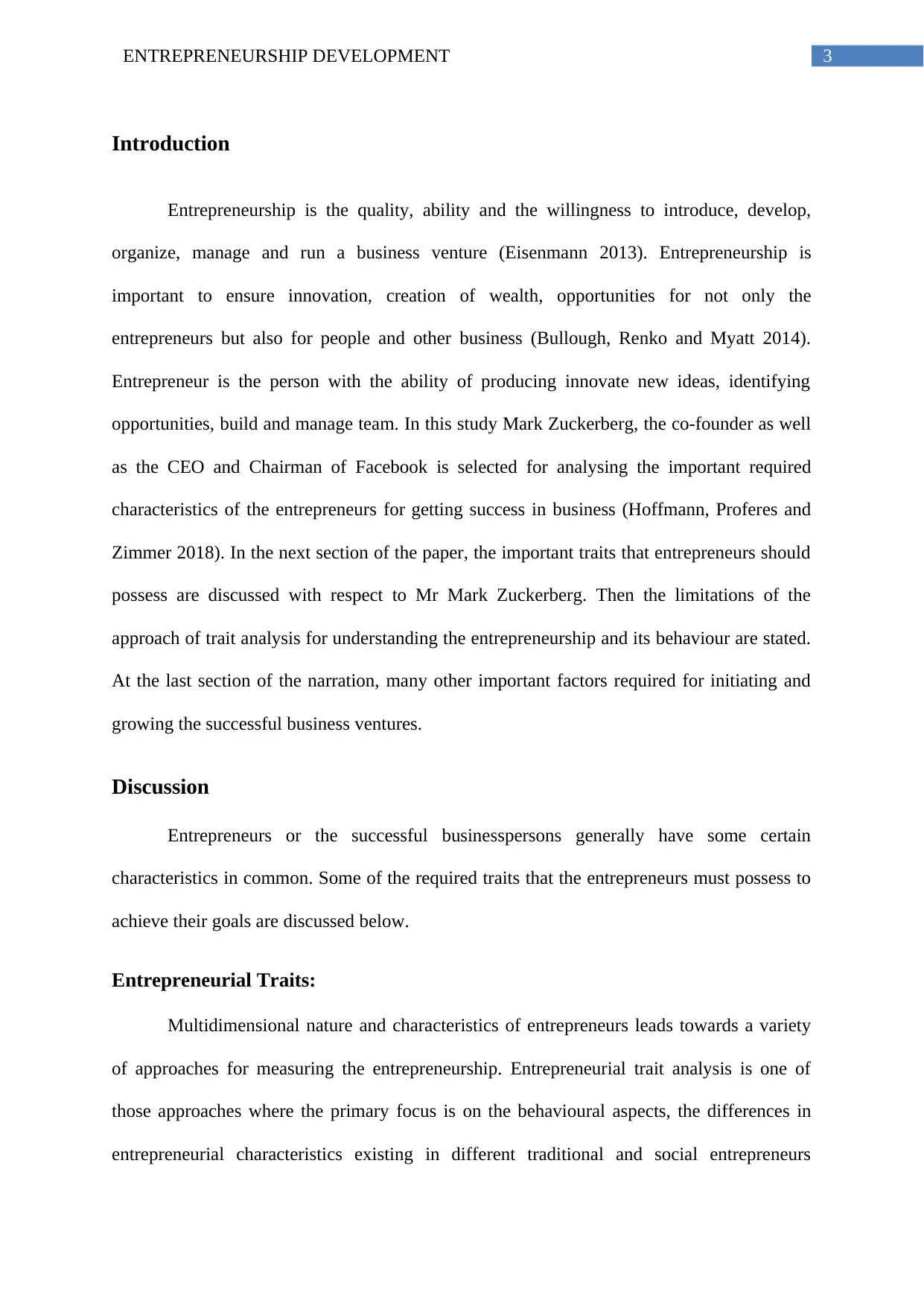
3ENTREPRENEURSHIP DEVELOPMENT
Introduction
Entrepreneurship is the quality, ability and the willingness to introduce, develop,
organize, manage and run a business venture (Eisenmann 2013). Entrepreneurship is
important to ensure innovation, creation of wealth, opportunities for not only the
entrepreneurs but also for people and other business (Bullough, Renko and Myatt 2014).
Entrepreneur is the person with the ability of producing innovate new ideas, identifying
opportunities, build and manage team. In this study Mark Zuckerberg, the co-founder as well
as the CEO and Chairman of Facebook is selected for analysing the important required
characteristics of the entrepreneurs for getting success in business (Hoffmann, Proferes and
Zimmer 2018). In the next section of the paper, the important traits that entrepreneurs should
possess are discussed with respect to Mr Mark Zuckerberg. Then the limitations of the
approach of trait analysis for understanding the entrepreneurship and its behaviour are stated.
At the last section of the narration, many other important factors required for initiating and
growing the successful business ventures.
Discussion
Entrepreneurs or the successful businesspersons generally have some certain
characteristics in common. Some of the required traits that the entrepreneurs must possess to
achieve their goals are discussed below.
Entrepreneurial Traits:
Multidimensional nature and characteristics of entrepreneurs leads towards a variety
of approaches for measuring the entrepreneurship. Entrepreneurial trait analysis is one of
those approaches where the primary focus is on the behavioural aspects, the differences in
entrepreneurial characteristics existing in different traditional and social entrepreneurs
Introduction
Entrepreneurship is the quality, ability and the willingness to introduce, develop,
organize, manage and run a business venture (Eisenmann 2013). Entrepreneurship is
important to ensure innovation, creation of wealth, opportunities for not only the
entrepreneurs but also for people and other business (Bullough, Renko and Myatt 2014).
Entrepreneur is the person with the ability of producing innovate new ideas, identifying
opportunities, build and manage team. In this study Mark Zuckerberg, the co-founder as well
as the CEO and Chairman of Facebook is selected for analysing the important required
characteristics of the entrepreneurs for getting success in business (Hoffmann, Proferes and
Zimmer 2018). In the next section of the paper, the important traits that entrepreneurs should
possess are discussed with respect to Mr Mark Zuckerberg. Then the limitations of the
approach of trait analysis for understanding the entrepreneurship and its behaviour are stated.
At the last section of the narration, many other important factors required for initiating and
growing the successful business ventures.
Discussion
Entrepreneurs or the successful businesspersons generally have some certain
characteristics in common. Some of the required traits that the entrepreneurs must possess to
achieve their goals are discussed below.
Entrepreneurial Traits:
Multidimensional nature and characteristics of entrepreneurs leads towards a variety
of approaches for measuring the entrepreneurship. Entrepreneurial trait analysis is one of
those approaches where the primary focus is on the behavioural aspects, the differences in
entrepreneurial characteristics existing in different traditional and social entrepreneurs
Paraphrase This Document
Need a fresh take? Get an instant paraphrase of this document with our AI Paraphraser
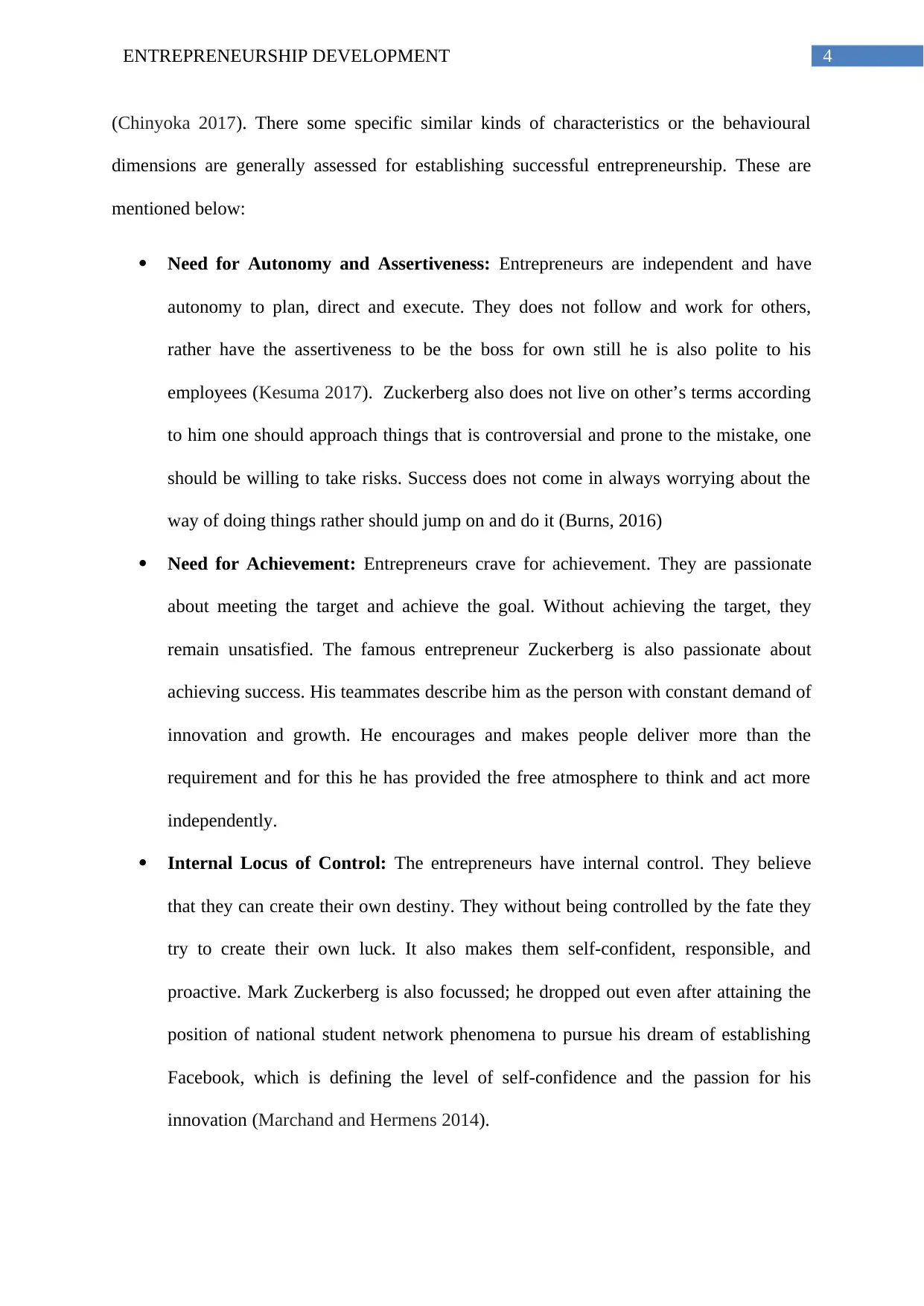
4ENTREPRENEURSHIP DEVELOPMENT
(Chinyoka 2017). There some specific similar kinds of characteristics or the behavioural
dimensions are generally assessed for establishing successful entrepreneurship. These are
mentioned below:
Need for Autonomy and Assertiveness: Entrepreneurs are independent and have
autonomy to plan, direct and execute. They does not follow and work for others,
rather have the assertiveness to be the boss for own still he is also polite to his
employees (Kesuma 2017). Zuckerberg also does not live on other’s terms according
to him one should approach things that is controversial and prone to the mistake, one
should be willing to take risks. Success does not come in always worrying about the
way of doing things rather should jump on and do it (Burns, 2016)
Need for Achievement: Entrepreneurs crave for achievement. They are passionate
about meeting the target and achieve the goal. Without achieving the target, they
remain unsatisfied. The famous entrepreneur Zuckerberg is also passionate about
achieving success. His teammates describe him as the person with constant demand of
innovation and growth. He encourages and makes people deliver more than the
requirement and for this he has provided the free atmosphere to think and act more
independently.
Internal Locus of Control: The entrepreneurs have internal control. They believe
that they can create their own destiny. They without being controlled by the fate they
try to create their own luck. It also makes them self-confident, responsible, and
proactive. Mark Zuckerberg is also focussed; he dropped out even after attaining the
position of national student network phenomena to pursue his dream of establishing
Facebook, which is defining the level of self-confidence and the passion for his
innovation (Marchand and Hermens 2014).
(Chinyoka 2017). There some specific similar kinds of characteristics or the behavioural
dimensions are generally assessed for establishing successful entrepreneurship. These are
mentioned below:
Need for Autonomy and Assertiveness: Entrepreneurs are independent and have
autonomy to plan, direct and execute. They does not follow and work for others,
rather have the assertiveness to be the boss for own still he is also polite to his
employees (Kesuma 2017). Zuckerberg also does not live on other’s terms according
to him one should approach things that is controversial and prone to the mistake, one
should be willing to take risks. Success does not come in always worrying about the
way of doing things rather should jump on and do it (Burns, 2016)
Need for Achievement: Entrepreneurs crave for achievement. They are passionate
about meeting the target and achieve the goal. Without achieving the target, they
remain unsatisfied. The famous entrepreneur Zuckerberg is also passionate about
achieving success. His teammates describe him as the person with constant demand of
innovation and growth. He encourages and makes people deliver more than the
requirement and for this he has provided the free atmosphere to think and act more
independently.
Internal Locus of Control: The entrepreneurs have internal control. They believe
that they can create their own destiny. They without being controlled by the fate they
try to create their own luck. It also makes them self-confident, responsible, and
proactive. Mark Zuckerberg is also focussed; he dropped out even after attaining the
position of national student network phenomena to pursue his dream of establishing
Facebook, which is defining the level of self-confidence and the passion for his
innovation (Marchand and Hermens 2014).
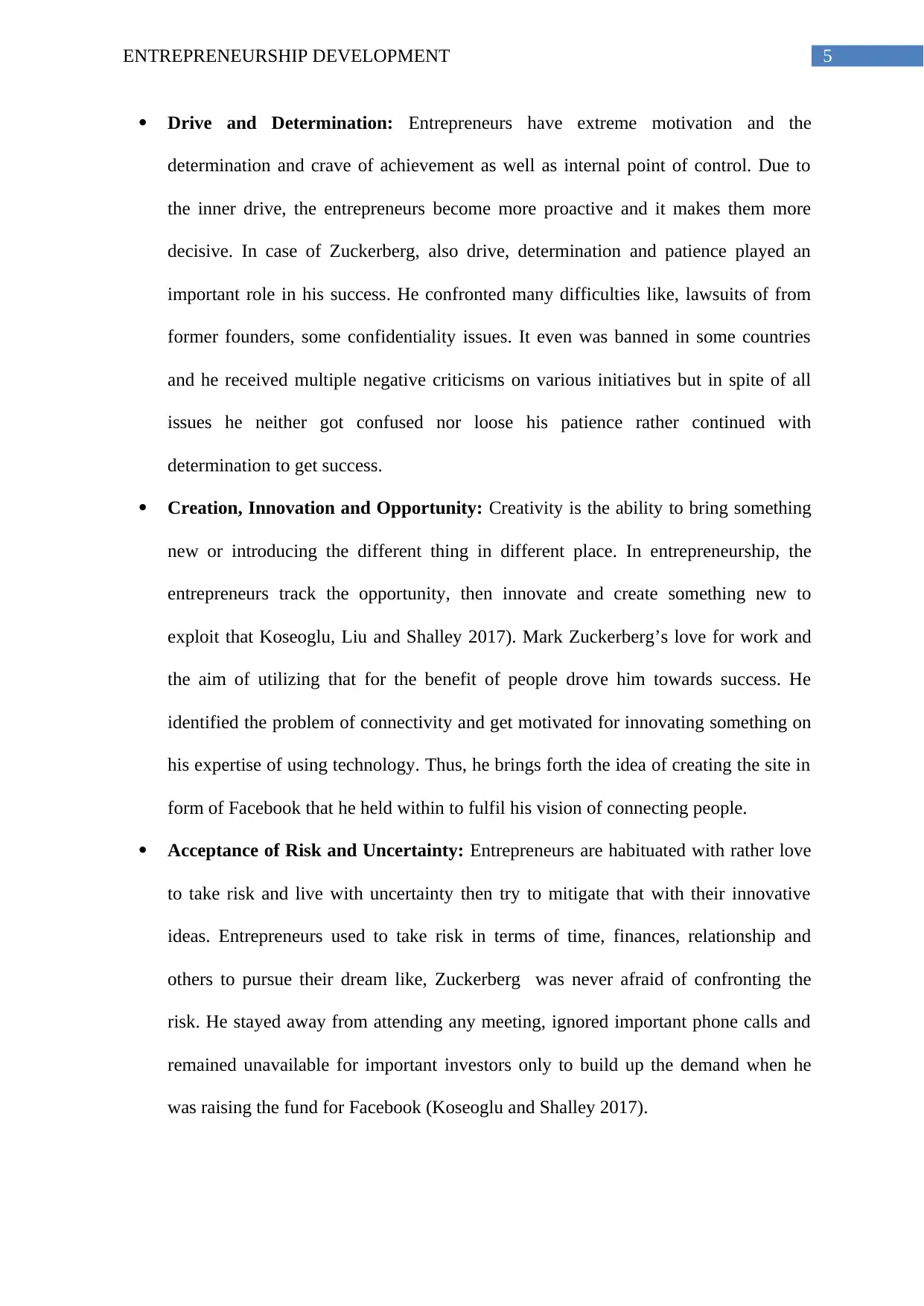
5ENTREPRENEURSHIP DEVELOPMENT
Drive and Determination: Entrepreneurs have extreme motivation and the
determination and crave of achievement as well as internal point of control. Due to
the inner drive, the entrepreneurs become more proactive and it makes them more
decisive. In case of Zuckerberg, also drive, determination and patience played an
important role in his success. He confronted many difficulties like, lawsuits of from
former founders, some confidentiality issues. It even was banned in some countries
and he received multiple negative criticisms on various initiatives but in spite of all
issues he neither got confused nor loose his patience rather continued with
determination to get success.
Creation, Innovation and Opportunity: Creativity is the ability to bring something
new or introducing the different thing in different place. In entrepreneurship, the
entrepreneurs track the opportunity, then innovate and create something new to
exploit that Koseoglu, Liu and Shalley 2017). Mark Zuckerberg’s love for work and
the aim of utilizing that for the benefit of people drove him towards success. He
identified the problem of connectivity and get motivated for innovating something on
his expertise of using technology. Thus, he brings forth the idea of creating the site in
form of Facebook that he held within to fulfil his vision of connecting people.
Acceptance of Risk and Uncertainty: Entrepreneurs are habituated with rather love
to take risk and live with uncertainty then try to mitigate that with their innovative
ideas. Entrepreneurs used to take risk in terms of time, finances, relationship and
others to pursue their dream like, Zuckerberg was never afraid of confronting the
risk. He stayed away from attending any meeting, ignored important phone calls and
remained unavailable for important investors only to build up the demand when he
was raising the fund for Facebook (Koseoglu and Shalley 2017).
Drive and Determination: Entrepreneurs have extreme motivation and the
determination and crave of achievement as well as internal point of control. Due to
the inner drive, the entrepreneurs become more proactive and it makes them more
decisive. In case of Zuckerberg, also drive, determination and patience played an
important role in his success. He confronted many difficulties like, lawsuits of from
former founders, some confidentiality issues. It even was banned in some countries
and he received multiple negative criticisms on various initiatives but in spite of all
issues he neither got confused nor loose his patience rather continued with
determination to get success.
Creation, Innovation and Opportunity: Creativity is the ability to bring something
new or introducing the different thing in different place. In entrepreneurship, the
entrepreneurs track the opportunity, then innovate and create something new to
exploit that Koseoglu, Liu and Shalley 2017). Mark Zuckerberg’s love for work and
the aim of utilizing that for the benefit of people drove him towards success. He
identified the problem of connectivity and get motivated for innovating something on
his expertise of using technology. Thus, he brings forth the idea of creating the site in
form of Facebook that he held within to fulfil his vision of connecting people.
Acceptance of Risk and Uncertainty: Entrepreneurs are habituated with rather love
to take risk and live with uncertainty then try to mitigate that with their innovative
ideas. Entrepreneurs used to take risk in terms of time, finances, relationship and
others to pursue their dream like, Zuckerberg was never afraid of confronting the
risk. He stayed away from attending any meeting, ignored important phone calls and
remained unavailable for important investors only to build up the demand when he
was raising the fund for Facebook (Koseoglu and Shalley 2017).
⊘ This is a preview!⊘
Do you want full access?
Subscribe today to unlock all pages.

Trusted by 1+ million students worldwide
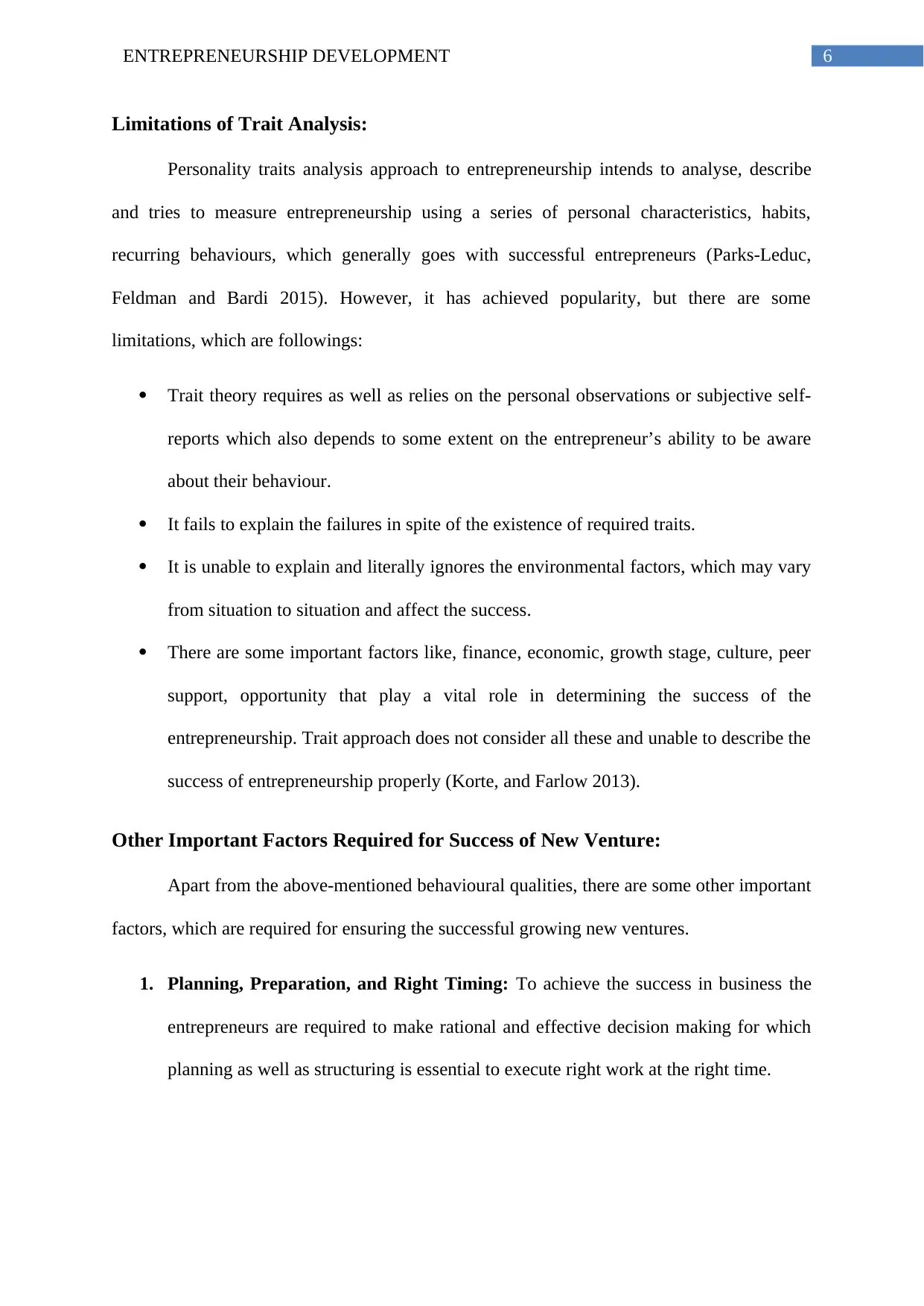
6ENTREPRENEURSHIP DEVELOPMENT
Limitations of Trait Analysis:
Personality traits analysis approach to entrepreneurship intends to analyse, describe
and tries to measure entrepreneurship using a series of personal characteristics, habits,
recurring behaviours, which generally goes with successful entrepreneurs (Parks-Leduc,
Feldman and Bardi 2015). However, it has achieved popularity, but there are some
limitations, which are followings:
Trait theory requires as well as relies on the personal observations or subjective self-
reports which also depends to some extent on the entrepreneur’s ability to be aware
about their behaviour.
It fails to explain the failures in spite of the existence of required traits.
It is unable to explain and literally ignores the environmental factors, which may vary
from situation to situation and affect the success.
There are some important factors like, finance, economic, growth stage, culture, peer
support, opportunity that play a vital role in determining the success of the
entrepreneurship. Trait approach does not consider all these and unable to describe the
success of entrepreneurship properly (Korte, and Farlow 2013).
Other Important Factors Required for Success of New Venture:
Apart from the above-mentioned behavioural qualities, there are some other important
factors, which are required for ensuring the successful growing new ventures.
1. Planning, Preparation, and Right Timing: To achieve the success in business the
entrepreneurs are required to make rational and effective decision making for which
planning as well as structuring is essential to execute right work at the right time.
Limitations of Trait Analysis:
Personality traits analysis approach to entrepreneurship intends to analyse, describe
and tries to measure entrepreneurship using a series of personal characteristics, habits,
recurring behaviours, which generally goes with successful entrepreneurs (Parks-Leduc,
Feldman and Bardi 2015). However, it has achieved popularity, but there are some
limitations, which are followings:
Trait theory requires as well as relies on the personal observations or subjective self-
reports which also depends to some extent on the entrepreneur’s ability to be aware
about their behaviour.
It fails to explain the failures in spite of the existence of required traits.
It is unable to explain and literally ignores the environmental factors, which may vary
from situation to situation and affect the success.
There are some important factors like, finance, economic, growth stage, culture, peer
support, opportunity that play a vital role in determining the success of the
entrepreneurship. Trait approach does not consider all these and unable to describe the
success of entrepreneurship properly (Korte, and Farlow 2013).
Other Important Factors Required for Success of New Venture:
Apart from the above-mentioned behavioural qualities, there are some other important
factors, which are required for ensuring the successful growing new ventures.
1. Planning, Preparation, and Right Timing: To achieve the success in business the
entrepreneurs are required to make rational and effective decision making for which
planning as well as structuring is essential to execute right work at the right time.
Paraphrase This Document
Need a fresh take? Get an instant paraphrase of this document with our AI Paraphraser
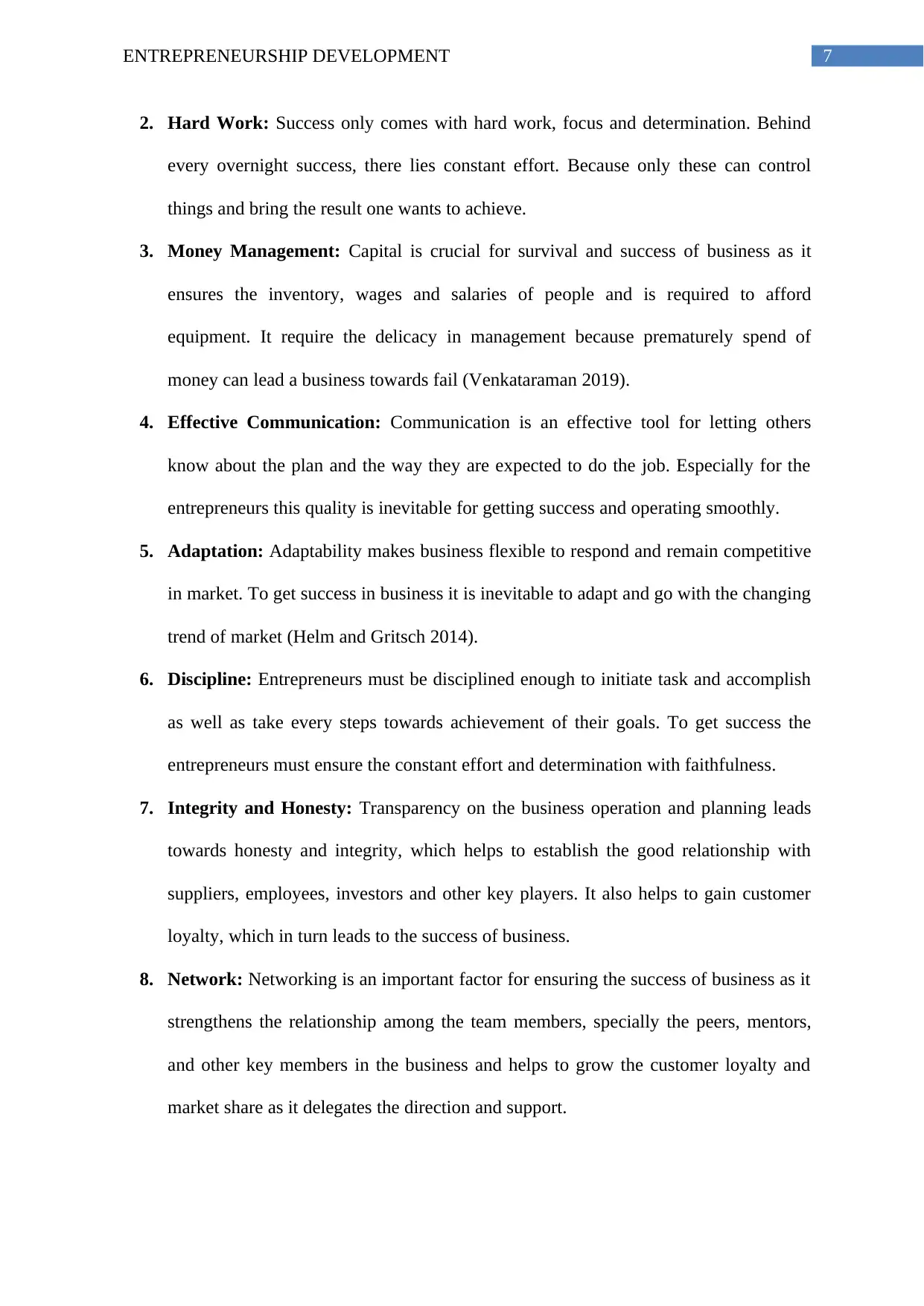
7ENTREPRENEURSHIP DEVELOPMENT
2. Hard Work: Success only comes with hard work, focus and determination. Behind
every overnight success, there lies constant effort. Because only these can control
things and bring the result one wants to achieve.
3. Money Management: Capital is crucial for survival and success of business as it
ensures the inventory, wages and salaries of people and is required to afford
equipment. It require the delicacy in management because prematurely spend of
money can lead a business towards fail (Venkataraman 2019).
4. Effective Communication: Communication is an effective tool for letting others
know about the plan and the way they are expected to do the job. Especially for the
entrepreneurs this quality is inevitable for getting success and operating smoothly.
5. Adaptation: Adaptability makes business flexible to respond and remain competitive
in market. To get success in business it is inevitable to adapt and go with the changing
trend of market (Helm and Gritsch 2014).
6. Discipline: Entrepreneurs must be disciplined enough to initiate task and accomplish
as well as take every steps towards achievement of their goals. To get success the
entrepreneurs must ensure the constant effort and determination with faithfulness.
7. Integrity and Honesty: Transparency on the business operation and planning leads
towards honesty and integrity, which helps to establish the good relationship with
suppliers, employees, investors and other key players. It also helps to gain customer
loyalty, which in turn leads to the success of business.
8. Network: Networking is an important factor for ensuring the success of business as it
strengthens the relationship among the team members, specially the peers, mentors,
and other key members in the business and helps to grow the customer loyalty and
market share as it delegates the direction and support.
2. Hard Work: Success only comes with hard work, focus and determination. Behind
every overnight success, there lies constant effort. Because only these can control
things and bring the result one wants to achieve.
3. Money Management: Capital is crucial for survival and success of business as it
ensures the inventory, wages and salaries of people and is required to afford
equipment. It require the delicacy in management because prematurely spend of
money can lead a business towards fail (Venkataraman 2019).
4. Effective Communication: Communication is an effective tool for letting others
know about the plan and the way they are expected to do the job. Especially for the
entrepreneurs this quality is inevitable for getting success and operating smoothly.
5. Adaptation: Adaptability makes business flexible to respond and remain competitive
in market. To get success in business it is inevitable to adapt and go with the changing
trend of market (Helm and Gritsch 2014).
6. Discipline: Entrepreneurs must be disciplined enough to initiate task and accomplish
as well as take every steps towards achievement of their goals. To get success the
entrepreneurs must ensure the constant effort and determination with faithfulness.
7. Integrity and Honesty: Transparency on the business operation and planning leads
towards honesty and integrity, which helps to establish the good relationship with
suppliers, employees, investors and other key players. It also helps to gain customer
loyalty, which in turn leads to the success of business.
8. Network: Networking is an important factor for ensuring the success of business as it
strengthens the relationship among the team members, specially the peers, mentors,
and other key members in the business and helps to grow the customer loyalty and
market share as it delegates the direction and support.
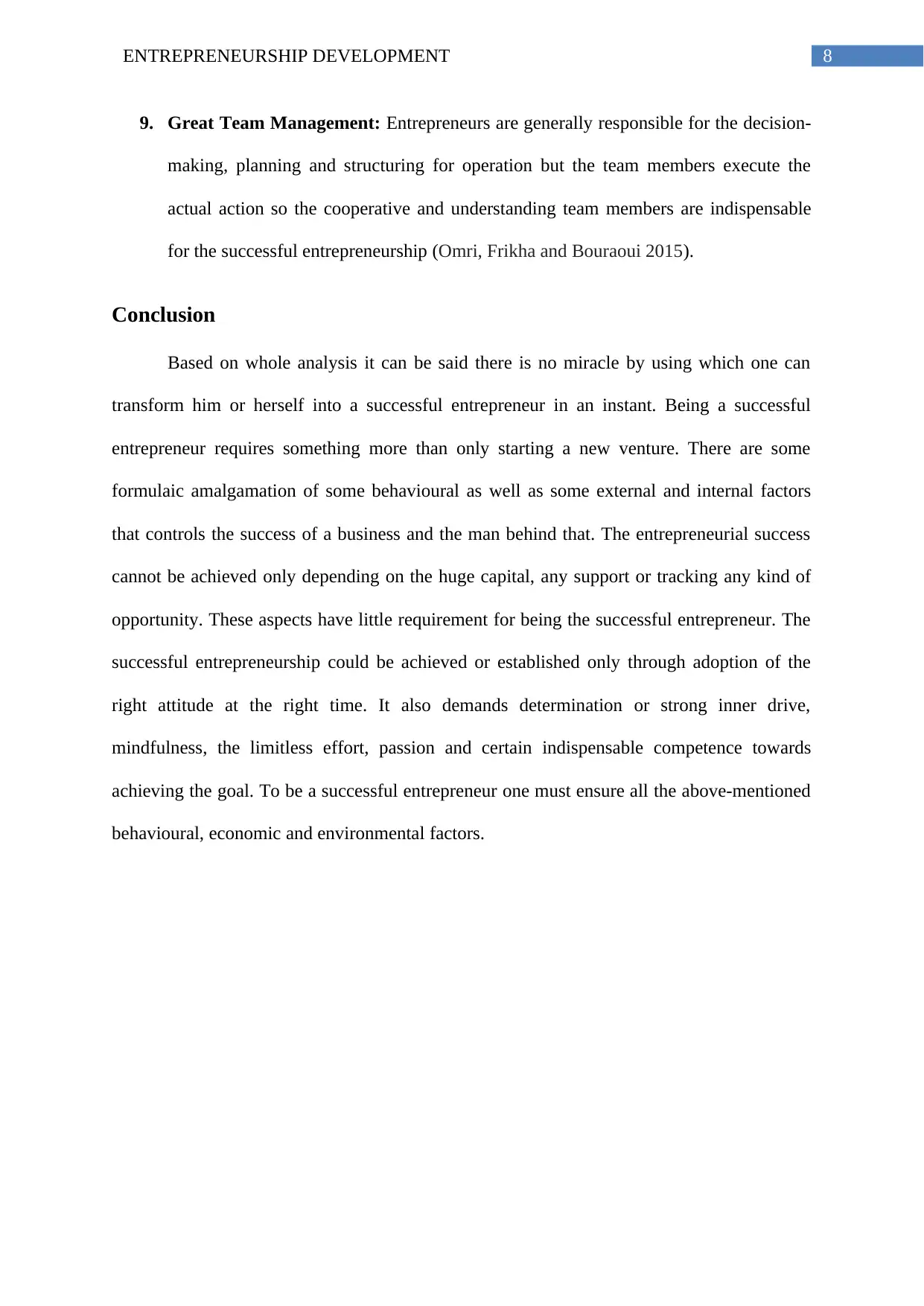
8ENTREPRENEURSHIP DEVELOPMENT
9. Great Team Management: Entrepreneurs are generally responsible for the decision-
making, planning and structuring for operation but the team members execute the
actual action so the cooperative and understanding team members are indispensable
for the successful entrepreneurship (Omri, Frikha and Bouraoui 2015).
Conclusion
Based on whole analysis it can be said there is no miracle by using which one can
transform him or herself into a successful entrepreneur in an instant. Being a successful
entrepreneur requires something more than only starting a new venture. There are some
formulaic amalgamation of some behavioural as well as some external and internal factors
that controls the success of a business and the man behind that. The entrepreneurial success
cannot be achieved only depending on the huge capital, any support or tracking any kind of
opportunity. These aspects have little requirement for being the successful entrepreneur. The
successful entrepreneurship could be achieved or established only through adoption of the
right attitude at the right time. It also demands determination or strong inner drive,
mindfulness, the limitless effort, passion and certain indispensable competence towards
achieving the goal. To be a successful entrepreneur one must ensure all the above-mentioned
behavioural, economic and environmental factors.
9. Great Team Management: Entrepreneurs are generally responsible for the decision-
making, planning and structuring for operation but the team members execute the
actual action so the cooperative and understanding team members are indispensable
for the successful entrepreneurship (Omri, Frikha and Bouraoui 2015).
Conclusion
Based on whole analysis it can be said there is no miracle by using which one can
transform him or herself into a successful entrepreneur in an instant. Being a successful
entrepreneur requires something more than only starting a new venture. There are some
formulaic amalgamation of some behavioural as well as some external and internal factors
that controls the success of a business and the man behind that. The entrepreneurial success
cannot be achieved only depending on the huge capital, any support or tracking any kind of
opportunity. These aspects have little requirement for being the successful entrepreneur. The
successful entrepreneurship could be achieved or established only through adoption of the
right attitude at the right time. It also demands determination or strong inner drive,
mindfulness, the limitless effort, passion and certain indispensable competence towards
achieving the goal. To be a successful entrepreneur one must ensure all the above-mentioned
behavioural, economic and environmental factors.
⊘ This is a preview!⊘
Do you want full access?
Subscribe today to unlock all pages.

Trusted by 1+ million students worldwide
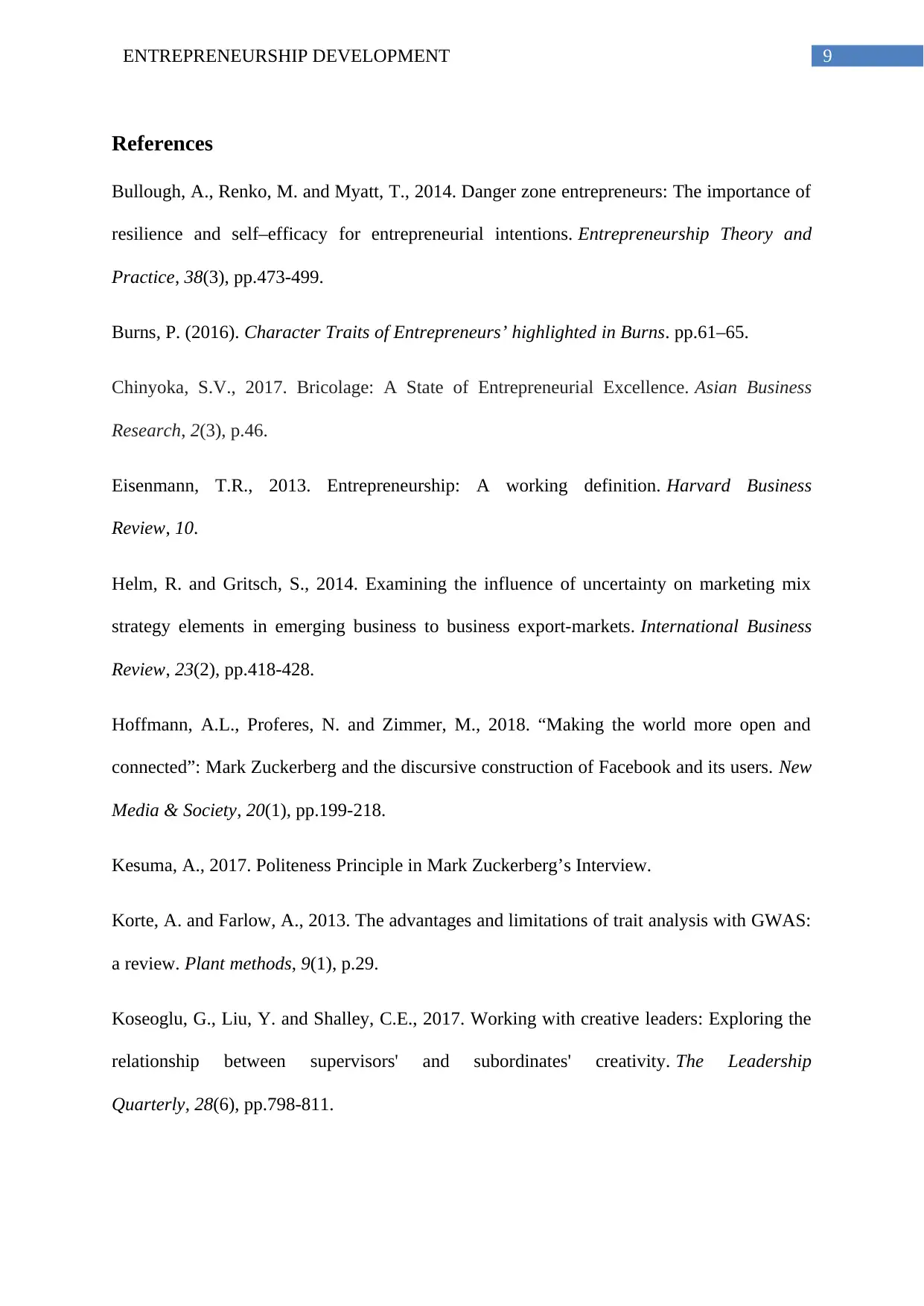
9ENTREPRENEURSHIP DEVELOPMENT
References
Bullough, A., Renko, M. and Myatt, T., 2014. Danger zone entrepreneurs: The importance of
resilience and self–efficacy for entrepreneurial intentions. Entrepreneurship Theory and
Practice, 38(3), pp.473-499.
Burns, P. (2016). Character Traits of Entrepreneurs’ highlighted in Burns. pp.61–65.
Chinyoka, S.V., 2017. Bricolage: A State of Entrepreneurial Excellence. Asian Business
Research, 2(3), p.46.
Eisenmann, T.R., 2013. Entrepreneurship: A working definition. Harvard Business
Review, 10.
Helm, R. and Gritsch, S., 2014. Examining the influence of uncertainty on marketing mix
strategy elements in emerging business to business export-markets. International Business
Review, 23(2), pp.418-428.
Hoffmann, A.L., Proferes, N. and Zimmer, M., 2018. “Making the world more open and
connected”: Mark Zuckerberg and the discursive construction of Facebook and its users. New
Media & Society, 20(1), pp.199-218.
Kesuma, A., 2017. Politeness Principle in Mark Zuckerberg’s Interview.
Korte, A. and Farlow, A., 2013. The advantages and limitations of trait analysis with GWAS:
a review. Plant methods, 9(1), p.29.
Koseoglu, G., Liu, Y. and Shalley, C.E., 2017. Working with creative leaders: Exploring the
relationship between supervisors' and subordinates' creativity. The Leadership
Quarterly, 28(6), pp.798-811.
References
Bullough, A., Renko, M. and Myatt, T., 2014. Danger zone entrepreneurs: The importance of
resilience and self–efficacy for entrepreneurial intentions. Entrepreneurship Theory and
Practice, 38(3), pp.473-499.
Burns, P. (2016). Character Traits of Entrepreneurs’ highlighted in Burns. pp.61–65.
Chinyoka, S.V., 2017. Bricolage: A State of Entrepreneurial Excellence. Asian Business
Research, 2(3), p.46.
Eisenmann, T.R., 2013. Entrepreneurship: A working definition. Harvard Business
Review, 10.
Helm, R. and Gritsch, S., 2014. Examining the influence of uncertainty on marketing mix
strategy elements in emerging business to business export-markets. International Business
Review, 23(2), pp.418-428.
Hoffmann, A.L., Proferes, N. and Zimmer, M., 2018. “Making the world more open and
connected”: Mark Zuckerberg and the discursive construction of Facebook and its users. New
Media & Society, 20(1), pp.199-218.
Kesuma, A., 2017. Politeness Principle in Mark Zuckerberg’s Interview.
Korte, A. and Farlow, A., 2013. The advantages and limitations of trait analysis with GWAS:
a review. Plant methods, 9(1), p.29.
Koseoglu, G., Liu, Y. and Shalley, C.E., 2017. Working with creative leaders: Exploring the
relationship between supervisors' and subordinates' creativity. The Leadership
Quarterly, 28(6), pp.798-811.
Paraphrase This Document
Need a fresh take? Get an instant paraphrase of this document with our AI Paraphraser
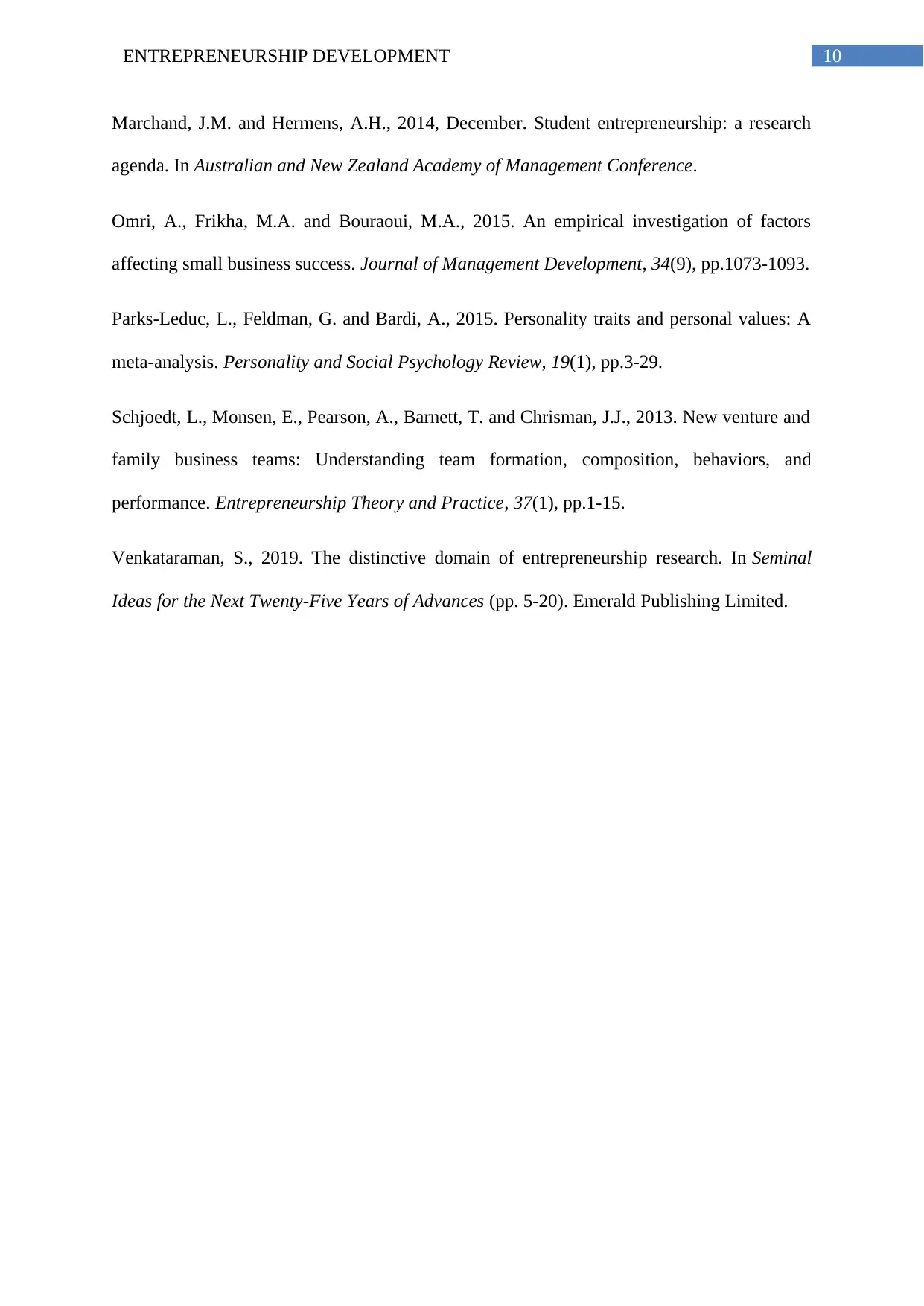
10ENTREPRENEURSHIP DEVELOPMENT
Marchand, J.M. and Hermens, A.H., 2014, December. Student entrepreneurship: a research
agenda. In Australian and New Zealand Academy of Management Conference.
Omri, A., Frikha, M.A. and Bouraoui, M.A., 2015. An empirical investigation of factors
affecting small business success. Journal of Management Development, 34(9), pp.1073-1093.
Parks-Leduc, L., Feldman, G. and Bardi, A., 2015. Personality traits and personal values: A
meta-analysis. Personality and Social Psychology Review, 19(1), pp.3-29.
Schjoedt, L., Monsen, E., Pearson, A., Barnett, T. and Chrisman, J.J., 2013. New venture and
family business teams: Understanding team formation, composition, behaviors, and
performance. Entrepreneurship Theory and Practice, 37(1), pp.1-15.
Venkataraman, S., 2019. The distinctive domain of entrepreneurship research. In Seminal
Ideas for the Next Twenty-Five Years of Advances (pp. 5-20). Emerald Publishing Limited.
Marchand, J.M. and Hermens, A.H., 2014, December. Student entrepreneurship: a research
agenda. In Australian and New Zealand Academy of Management Conference.
Omri, A., Frikha, M.A. and Bouraoui, M.A., 2015. An empirical investigation of factors
affecting small business success. Journal of Management Development, 34(9), pp.1073-1093.
Parks-Leduc, L., Feldman, G. and Bardi, A., 2015. Personality traits and personal values: A
meta-analysis. Personality and Social Psychology Review, 19(1), pp.3-29.
Schjoedt, L., Monsen, E., Pearson, A., Barnett, T. and Chrisman, J.J., 2013. New venture and
family business teams: Understanding team formation, composition, behaviors, and
performance. Entrepreneurship Theory and Practice, 37(1), pp.1-15.
Venkataraman, S., 2019. The distinctive domain of entrepreneurship research. In Seminal
Ideas for the Next Twenty-Five Years of Advances (pp. 5-20). Emerald Publishing Limited.
1 out of 11
Related Documents
Your All-in-One AI-Powered Toolkit for Academic Success.
+13062052269
info@desklib.com
Available 24*7 on WhatsApp / Email
![[object Object]](/_next/static/media/star-bottom.7253800d.svg)
Unlock your academic potential
Copyright © 2020–2026 A2Z Services. All Rights Reserved. Developed and managed by ZUCOL.





